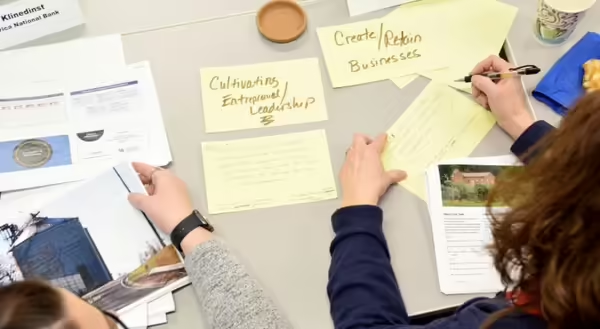
Many voices, one vision
The USDA Rural Economic Development Innovation (REDI) Initiative planning process started with a two-day countywide community-building event, held at The Nature Conservancy Office at Emiquon, on January 22 and 23, 2020. The opening event served as a platform for community members to gather, exchange ideas, discuss common challenges and opportunities, and share ideas to make Fulton County a better place to live, work and play.
More than 20 different businesses and organizations from throughout the county participated in the USDA REDI Workshop. Their discussions focused on four major areas:
- Workforce development
- Diversity and inclusion
- Innovation and entrepreneurship
- Quality of life and place
The Purdue University Center for Regional Development and University of Kentucky College of Agriculture, Food and Environment provided demographic and programming support throughout the planning process – key demographic reports included Industry Cluster Analysis, COVID 19 Impacts on Fulton County, and Fulton County Data Snapshot.
In small breakout groups facilitated by Purdue University and University of Kentucky representatives, participants explored these topics from a county perspective to generate ideas on how we can create a healthy and thriving rural economic development climate. Fulton County USDA Rural Economic Development Innovation Initiative Report January 2021 summarizes the results of these discussions, initiated in January 2020 and continued throughout the year in small group stakeholder meetings.
One of the most important benefits of the REDI efforts is that it created a platform for new connections among community members, expanded networks, built local capacity for action, all while providing critical technical support, and allowing community leaders an opportunity to identify and discuss important issues - together. A well-documented plan is a valuable tool that can be leveraged for growth and development in a community or region. The collaboration used proven methods to help leaders gather information, analyze data, assess options, and develop action plans. In the end, Fulton County communities, with the support of land grant university system partnerships including Illinois Extension, garnered more than $8 million in grants to support local projects.
Planning outcomes
The process has helped engage a range of partners, including local economic development organizations, community leaders and residents, the private sector, educational institutions, and other stakeholders in planning for the future of Fulton County. As a result, the process has helped identify locally grown strategies that will guide county economic development, encourage partnerships and collaboration, and improve economic outcomes and overall quality of life in Fulton County. Thanks to the USDA Rural Economic Development Innovation (REDI) Initiative, the Fulton County REDI team has created the capacity-building foundation needed to ensure that public sector entities, working in conjunction with other economic actors (individuals, firms, industries), can create the environment that is essential for achieving county and regional economic prosperity.
Related stories
Rural communities see growth: Collaboration yields $8 million in grants
ABOUT THE AUTHOR: Kathie Brown, University of Illinois Extension Community and Economic Development educator {retired June 2021} As a community and economic development educator, Kathie Brown works with community leaders, government officials, volunteer groups, small business owners, and others to help communities become stronger and more economically viable. She focuses on leadership and organizational development; local government education and relations; economic development strategies; participatory community planning/visioning processes; group process facilitation; collaboration and partnership building; public issue education; and understanding, using, and developing data.
Brown works with organizations and local governments to help them: (1) analyze and understand their needs, (2) identify alternative courses of action, (3) make informed decisions, (4) plan for the future, and (5) evaluate their development efforts.
Kathie has worked for Extension for almost 40 years, contributing to programs related to community health, digital literacy, STEAM education, and more.
This position focuses on the core skill areas of strategic planning, community leadership skills, data for decision making, needs assessment, and collaboration. Programmatic areas are leadership development, education for economic development, public policy education, and data/information and referral services.
ABOUT THE BLOG: Building Entrepreneurial Communities: Strategies for strengthening local economies.